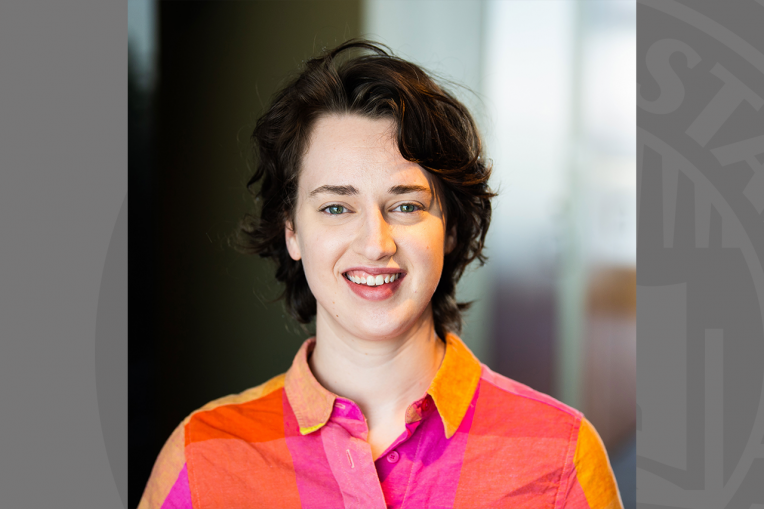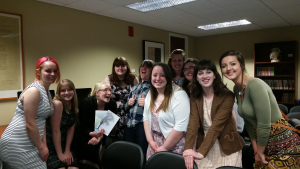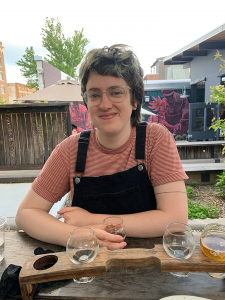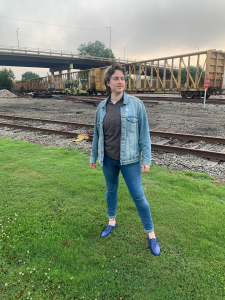Anya Malley ’17, one of the many alumni of Illinois State University’s Department of English, received their Bachelor of Arts through the publishing studies program at Illinois State after earning an associate’s degree from Waubonsee Community College. During their time at the University, they gained valuable hands-on experience as a copy editor and later as a night editor for The Vidette, as an editorial and production assistant for PRESS 254, and as a production intern at the Publications Unit. In addition, Malley was a staff member of the Euphemism literary journal at Illinois State and was involved in many other clubs and organizations.
Malley went on to become an editorial assistant and, recently, associate editor at Learning for Justice (LFJ) at the Southern Poverty Law Center (SPLC) in Montgomery, Alabama. There they work to copy edit and proofread publications, articles, emails, and more. They are tasked with conducting interviews and writing articles and emails that are distributed to a wide audience. They also enjoy building community in the LGBTQ+ affinity group as part of their work. Malley has used their undergraduate degree to establish themselves firmly in the world of publishing.
We had the opportunity to interview Malley about their experience in the publishing studies program and how that contributed to the career they are building.
What influenced you to choose the publishing studies program at Illinois State?
During my high school creative writing class, I realized that I really loved the “peer edit” portion of each project. I loved checking for spelling and grammar as well as offering tips on how to make a piece more easily understandable. After obtaining my associate’s in liberal arts, I knew I wanted to study English in some capacity, and I looked into many programs. Immediately, I was attracted to the Illinois State publishing studies track. The opportunity to learn such an interesting variety of trades—proofreading, editing, layout, marketing, and more—stirred me. Further, reading about the Publications Unit and programs like Euphemism, the University’s literary arts journal, really helped me lock in my decision to attend Illinois State and study publishing.
How did your experiences at the Publications Unit and the publishing studies sequence prepare you for the work you are doing now? And what experiences outside of school or internship work prepared you for your current position?
The work at the Publications Unit strengthened a lot of my skills, including formatting. While working on the Fiction Collective Two novel Glory Hole by Stephen Beachy, I had to do a lot of specific formatting work on things like widows and orphans. This helped me enormously when working on Learning for Justice publications, like our Social Justice Standards facilitator guide and the Best Practices for Serving LGBTQ Students guide. I helped format these lengthy guides so that they conformed to SPLC style, and I ensured the setup made sense visually and contextually.
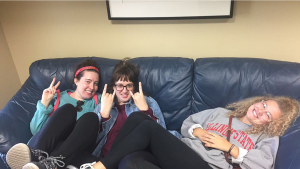
Additionally, having the opportunity to work with Steve Halle and Holms Troelstrup on such important projects built up my confidence in my writing and editing. Editing several journals, a novel, and a newsletter made me realize that I could do this work—and that I could do so both independently and collaboratively. I gained insight on the publishing process thanks to our weekly roundtables as well as one-on-ones with Steve, Holms, and other interns and fellows. This knowledge is incomparable, and it helped me to better navigate the world of professional publishing and editing.
Also, because of my work as a co-editor for Euphemism, I was more prepared for my current role as the reviewer of all freelance submissions.
Right out of college, I wasn’t sure what I wanted to do. I worked at Destihl Brewery as a server, and I wouldn’t change that decision for the world. I absolutely loved my job, adored my coworkers (we all became beer besties), and admired myself for gaining the experiences that I did. I learned so much about customer service and serving other people, which led me to better understand what I wanted to do next.
Are there any experiences that you wish you had before you started working in this position?
Honestly, I’m learning to “fly the plane as I build it,” and I think that’s perfectly fine. I believe it’s normal to not know how to do everything at a job prior to gaining the position. For example, I had written copy and performed technical writing tasks during college, but I had never written copy for email newsletters before. Now, I’m crafting emails at least once a week. It’s taken me years of practice, but I feel comfortable learning on the job, and I think that’s an important skill since every career is different and not every publishing or editorial position requires exactly the same skill set and background.
What was the hardest part about transitioning from college to a professional position? What advice can you give current students as they search for jobs?
I had quite a time adjusting to the nine-to-five work schedule and working in one place the whole day. I was used to working long hours during college, but I was more accustomed to working whenever I wanted—usually even into late night/early mornings. I was also used to a more dynamic work space location-wise, traveling from class to the Publications Unit to class to the library to my apartment. But when I started my career, I was working in the office, and I was expected to work around the clock from the time I got to the office until evening—staying in the same place except for the occasional session working from the office cafeteria or a conference room. Now that I work full-time from home due to the pandemic, I have a bit more flexibility in my schedule and in choosing where I work from.
I’d recommend really thinking deeply about what type of environment you’d like to work in. Do you like being in person with your team? Do you like having your own office, or are you comfortable with a more open-concept work space? And if you’d prefer to work from home or to set your own schedule, be sure to take that into account. See what remote work benefits your potential job offers, and if you get an offer, consider whether and what you want to try to negotiate in terms of not just salary but also benefits and perks. You’re going to spend a lot of time at your job, and you should make sure you like the conditions and the setup.
Can you describe what a typical workday looks like for you?
My typical workday begins with checking my email for any outstanding requests. Often, I get assigned to proofread, fact-check, or quality-check online articles or magazine stories or interviews. I’ll also check the submissions inbox for any new freelance submissions. I review all of our submissions—for short articles and magazine feature stories—and decide whether they are up to our standards and if the focus is appropriate and time-sensitive; if so, I pass them forward to our associate editor and/or managing editor, depending on the type of submission.
Next, I manage “The Moment,” which is on our homepage. “The Moment” responds to current events—it allows educators to support students through what is happening right now, whether that be a cultural crisis or something else that requires addressing. I compile Learning for Justice resources that speak to the event or ongoing happenings, and I draft copy that connects the resources to the theme.
“I listened and learned, and when I heard people were taking action to fight the injustices I heard about, I jumped at the opportunity—it was then that I joined the SPLC organizing committee.”
Additionally, I monitor all of our social media posts before they are published. Here, I’m proofreading for grammar and punctuation, but I’m also checking for red-flags, like anything in the resources we share. I approve the posts, and then one of our senior writers schedules the posts in Sprout to publish online.
Finally, I might have a department meeting with all of LFJ. We’ll talk about our upcoming campaign that’s responding to the anti-critical race theory bills being passed in several states. I’m a part of the Campaign Strategic Messaging team for this, so I’m involved in crafting our potential communications and what we are saying in this critical moment. Our team will report to the full group some of the considerations we’ve discussed and some of the key messaging points we want to include for our audience, which is educators and students but also caregivers and school administration.
I’m also involved in affinity groups at SPLC. I founded an LGBTQIA+ affinity group, and I’m a participator in the trans+/nonbinary group. Sometimes, we gather to discuss happenings at the Center and whether we can support one another—collectively or individually—in any way.
What is something many people might not know about the field of publishing in general and about your position specifically?
While I worked at the Publications Unit, I had a taste of developmental editing, but as an associate editor, it is a larger portion of my job than I’d expected. Because I’m reviewing and editing our submissions, I’m constantly considering “what does this piece need?” Or “how could this improve?” Likewise, toward the beginning of my career with LFJ, I edited an interview for length—keeping certain sections or removing or reordering them and noting why they belonged. At first I found this a bit tedious, but eventually I grew to love it. The power to help shape the narrative was delightful. I excelled at this task, and now my supervisor asks me to do this with many of our feature interviews. There is a lot of trial and error when you’re starting your career in publishing since you’ll be tasked with projects you’ve never done before. I recommend not writing anything off before you try it—you may even stumble upon an assignment that pleasantly surprises you.
Also, because I work at a large national organization, the company has its own creative team of designers and formatters. Beforehand, I was expecting to work on some layouts and graphic design on top of my editing duties, but our organization has a team of people who solely work on that. Instead, I work alongside Creative on tasks like copyediting and proofreading captions, quality-checking publication layouts, and requesting images for newsletter blasts and web pages.
Have you witnessed any changes in the publishing industry since you started your work in college? Do you have any speculations for changes in the future? How has COVID-19 effected your work?
Publishing includes the larger picture and the smaller details that go into the production of a project. I perform editorial work, but I also do a lot of marketing and social media, and previously I did various administrative work. On the administrative side, I have written contracts and processed invoices. When COVID hit, I got brought in to do more marketing and social media work. Our team was fluctuating, and we became a bit more flexible, schedule and otherwise, understanding that several folks on our team are parents or have family members they care for. We’ve been working from home since March 2020, something I’m so grateful for. I believe that this flexibility will continue, depending on the type of publishing you’re working in. For books, I suspect it may be harder to perform remote work, but for magazines and online publishing, I think it’s likely.
How have you used your skills to leave an impact on others in your field?
Empathy is one of my top skills, as well as positivity and seeing a future that can be better. This helped me with my organizing ventures. In the first few weeks that I worked at SPLC, I heard from several people outside of my department who were dealing with hardships, including people who were terribly, painfully harmed and wronged by our management. I listened and learned, and when I heard people were taking action to fight the injustices I heard about, I jumped at the opportunity—it was then that I joined the SPLC organizing committee. We worked hard to speak with people across the organization and at different locations to hear concerns, have them sign union cards, and eventually vote for a union. Worker morale was extremely low through this time as there was a lot of turmoil, change, and inequitable power dynamics, so I relied on my positivity and empathy through these times. I try to remain enthusiastic during periods of change—there will absolutely be changes throughout your career, and you can utilize your skills and strengths to create new opportunities. I organized an LGBTQIA+ affinity group to come together and really listen to one another’s stories and needs.
What is your favorite part about your current job?
My favorite part of my job is the opportunity to learn. I am educating myself, being educated, and unlearning and relearning daily. For example, our department participates in professional development trainings led by our Learning in Schools team. Currently, we’re learning about the history of African enslavement and Indigenous enslavement. We read primary sources and discuss them in small groups, answering critical thinking questions about the texts. I’m learning so much, and I’m so grateful to be able to listen to ideas and offer my thoughts about such essential learning. I’m also thankful that I have the space to reflect and work on myself. When I talk about unlearning, I mean unlearning the ways that white supremacy culture is engrained in our personal lives, work lives, and all our systems. In a whiteness affinity group within my department, we discuss the characteristics of white supremacy, how it affects us, and how we can continue to de-center whiteness, address white supremacy, and grow. These learning opportunities are unmatched, and I know that I wouldn’t necessarily have the time and space for this learning if I worked at another organization that didn’t prioritize anti-racism and social justice. I can’t express how appreciative I am for this time learning and growing with my team. I highly recommend checking out our Teaching Hard History resources, including these Key Concept videos with scholars.
Is there anything that we have not asked that you would like to share?
Go for the job that you want. It can feel terrifying to apply for something that you think you may not be “qualified” for—I felt that way when I was applying to SPLC. But know that you are worthy of any position you desire, and you should go for it. Also, you will learn so much while you’re on the job, and that is completely fine. Additionally, don’t feel pressured to have a job in the field. We gain a lot of diverse experience in the publishing studies program, and we also do so in our experiences outside of our coursework, so spend some time really thinking about what you’d like to do and where you’d like to be. And know that you are in the right place no matter where you are.
About the Author: Alex Wright is an undergraduate at Illinois State University majoring in the publishing studies program within the English Department. He works as a production assistant intern at the Publications Unit, and he is the president of InterVarsity Christian Fellowship. When he has free time, which is very rare, he is usually spending time with his girlfriend, in front of a screen with a video game, or watching Avatar: The Last Airbender.
You can find additional information about the publishing studies sequence and internship and assistantship student opportunities at the Publications Unit or contact Steve Halle, director of the Publications Unit, at cshalle@IllinoisState.edu or (309) 438-7481. Follow the Publications Unit on Twitter @PubUnit_ISU and on Instagram @PubUnit.
